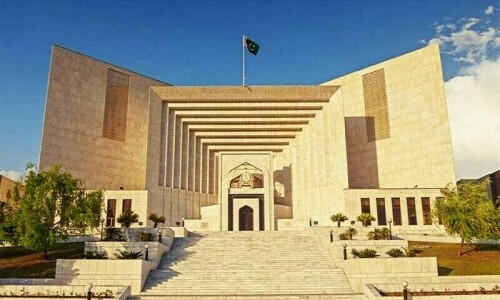ISLAMABAD/KARACHI, Aug 26: At a time when people in Karachi have to endure long hours of loadshedding, in some areas for up to 12 hours, the financial managers of the country have decided to pass on the full impact of high oil prices in the international market to them.
The old regime did not allow an increase of more than five per cent in consumer tariff as a result of change in fuel price.
A meeting of the Economic Coordination Committee (ECC) of the cabinet, presided over by Finance Minister Syed Naveed Qamar on Tuesday, removed this cap, allowing the passing on of the entire increase in oil prices to consumers.
The ECC meeting also decided to treat the KESC at par with distribution companies of Water and Power Development Authority (Wapda) so that the National Transmission and Dispatch Company (NTDC) charged the same power purchase rates from the KESC as the distribution companies of Wapda.
Under the existing arrangement, the NTDC sells about 750MW of electricity to the KESC at about Rs10 per unit compared with Rs3.70 per unit from Wapda’s distribution companies on the grounds that the Karachi utility company was not an integrated entity of Wapda.
The decisions have been allowed on the recommendations of a ministerial committee and demands of KESC’s foreign management to reduce its financial pressure. Now, the KESC will be able to recover full financial cost of fuel oil from consumers while its power purchase cost would drop by more than 40 per cent.
On Tuesday, the KESC was getting about 500MW from Pakistan Electric Power Company (Pepco) and another 210MW from other producers. The megacity requires over 2,200MW.
However, due to the non-functioning of two units of the Bin Qasim thermal power plant and one unit of the Korangi power thermal station, the utility has been producing only 600MW on its own. It has not been getting any supply from the Karachi Nuclear Power Plant since Aug 22.
The government seems to be unconcerned about the problem, as there seems to be no intervention from its side to protect the consumers. Analysts say the only intervention has been to the advantage of the privatised management in the form of an increase in tariff.
Some sources go to the extent of saying that the utility’s management was closing down different units to blackmail the government into enhancing tariff, and to pay its outstanding dues to the gas and oil companies and Pepco and Wapda.
Representatives of trade and business organisations have criticised the indifferent attitude of the authorities as well as of the KESC management.
















































Dear visitor, the comments section is undergoing an overhaul and will return soon.